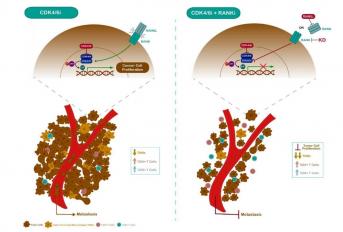Associação Portuguesa de Investigação em Cancro
Inibição da via RANK sensibiliza o cancro da mama triplo negativo a inibidores de CDK4/6 e potencia a resposta imunitária
Inibição da via RANK sensibiliza o cancro da mama triplo negativo a inibidores de CDK4/6 e potencia a resposta imunitária

Este estudo liderado por Sandra Casimiro e Luis Costa, do Laboratório de Oncologia Translacional do GIMM CARE, da Fundação GIMM – Gulbenkian Institute for Molecular Medicine, demonstra a potencial eficácia de uma nova terapêutica para o cancro da mama triplo-negativo (TNBC) — um tipo agressivo de cancro da mama em que as opções de tratamento estão limitadas à quimioterapia para a grande maioria dos doentes. A inibição genética ou farmacológica do recetor RANK, associado a pior prognóstico em TNBC, sensibilizou as células tumorais a inibidores de CDK4/6, que não demonstram eficácia em monoterapia neste tipo de cancro, impedindo o crescimento de tumores em modelos animais. Para além disso, este tratamento desencadeou uma resposta imunitária anti-tumoral. Os resultados obtidos abrem portas a estudos clínicos em doentes com cancro da mama triplo negativo, podendo ser estendidos a outros subtipos de cancro da mama ou outros tumores sólidos. O estudo foi publicado na revista Molecular Cancer Therapeutics da prestigiada American Association for Cancer Research (AACR).
Autores e Afiliações:
Inês Gomes1,ⱡ<, Maria Martelo1,ⱡ, Rúben D. Vilela1,ⱡ, María Jiménez2, Eva M. Trinidad3, Jorge Gomez-Miragaya3, Eva González-Suárez2,3, Érica Martins1, Sofia S. Torres4, Patrícia Corredeira1, Joana L. Miranda1, André Mansinho1,4,5, Sofia Torres6, Catarina Abreu4,6, Rita Sousa4,6, Sandra Casimiro1,4,# and Luis Costa1,4,6,#
1. Oncology Translational Laboratory, GIMM - Gulbenkian Institute for Molecular Medicine, Lisbon, Portugal.
2. Spanish National Cancer Research Centre (CNIO), Madrid, Spain.
3. Oncobell, Bellvitge Biomedical Research Institute, IDIBELL, Barcelona, Spain.
4. Faculty of Medicine, University of Lisbon, Lisbon, Portugal.
5. START Lisbon, Local Health Unit of Santa Maria, Lisbon, Portugal.
6. Oncology Division, Local Health Unit of Santa Maria, Lisbon, Portugal
ⱡThese authors contributed equally to this work
#Co-senior authors
Abstract:
Despite chemotherapy's limitations and toxic effects, it remains the primary treatment for most triple-negative breast cancer (TNBC) patients, with or without immune checkpoint inhibitors (ICI). While cyclin-dependent kinase 4/6 inhibitors (CDK4/6i) combined with endocrine therapy have revolutionized luminal BC treatment, CDK4/6i alone are largely ineffective in TNBC, even with functional retinoblastoma protein (pRB). Activation of the receptor activator of nuclear factor-κB (RANK) pathway has been associated with poor prognosis in TNBC and with resistance to CDK4/6i in luminal BC, effects that can be reversed by RANK ligand inhibitors (RANKLi). In this study, we analyzed the effect of RANK knockdown (KD) or RANKLi in the response of pRB-proficient TNBC to CDK4/6i in vitro. RANK+ patient-derived xenograft (PDX) and cell line-derived xenograft models were used to assess therapeutic efficacy of CDK4/6i + RANKLi in vivo. Two syngeneic models of TNBC and luminal BC were used to portrait the main therapy-induced alterations in the tumor immune microenvironment. RANK KD or RANKLi sensitized pRB-proficient TNBC cells to CDK4/6i in vitro. The combination of palbociclib and RANKLi regressed or prevented tumor growth and metastasis in vivo, enhancing cell cycle arrest. Both CDK4/6i and RANKLi elicited an anti-tumor immune response, characterized by an increase in CD4+ and CD8+ T cells and a decrease in tumor-associated macrophage’s (TAMs) infiltrating the tumor microenvironment. These findings suggest that combining CDK4/6i and RANKLi could offer a new therapeutic strategy for pRB-proficient TNBC, holding potential immunomodulatory benefits across BC subtypes.
Revista: Molecular Cancer Therapeutics




